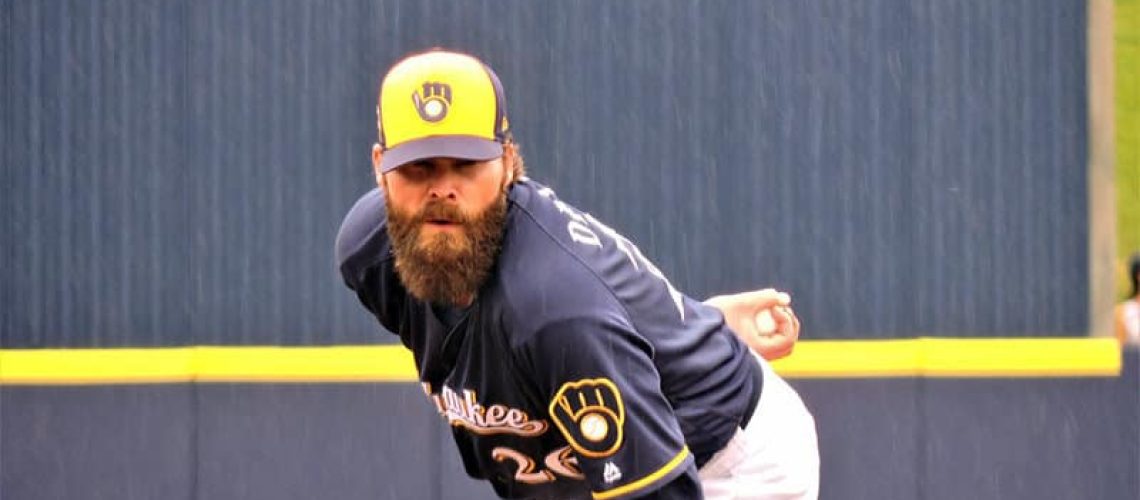
Kelly Landry
Tim Dillard being Tim Dillard
“The best thing we can do as a Christian is relate to other people in a human way and acknowledge that.”
Many people know Tim Dillard, former Milwaukee Brewers’ pitcher, as an amateur funny man who posts spoofy videos on Twitter of players in the clubhouse. His strongest suit as a comedian lies in his ability to make his baseball career seem mundane, unimportant, even a bit ridiculous.
Dillard’s comedic calling card is actually the foundation for his philosophy on life. Like any good comedian, those things he makes fun of (the intensity of preparing for a game, the importance of winning) ring with an element of truth that reverberates beyond the two-minutes of laughter. He is making fun of the pressures we place on ourselves—pressures to perform, to advance, to win—and the failure we assign ourselves when we are unable to control our circumstances.
Dillard has found that humor helps relieve the crushing burden so many athletes bear on their shoulders every day because they feel responsible for their performance on the field. This can be really important, especially in the lives of young players who have never experienced significant failure in their careers.
“Failure shakes their foundation because their foundation has always been their success as a ball player. What happens when that foundation gets shaken? What’s left?”

Tim Dillard in – ‘Castaway?’
In Dillard’s career, he has gone through so many rounds of success and failure that he has been able to gain a more balanced perspective. That is the blessing of being a veteran.
Still, being a man of experience doesn’t take away the sting of a rough outing or the uncertainty of a new assignment. There is something more that Dillard has found to sustain him.
“I am free to fail because it is not my job to determine the outcome of my circumstances. It is God who leads me and sustains me through the Holy Spirit. My job is to focus on what’s before me now, in the next five minutes.”
He can find peace and contentment being the ballplayer he is, whether that resume meets anyone’s standards or not, because he knows that baseball is his assignment for the time being. Within that assignment, he cannot waste minutes and hours and days fixating on a bad outing.
“You have to be okay with failing. I have to believe that God has a purpose for me even when things don’t go as I planned them. If I try to control the outcome, then I am failing, because my job is to have faith in God. To believe that He will use this situation for my good, even if I can’t see that at the time.”

Tim Dillard – It ain’t easy being…
In this freedom Dillard has found, to live without the pressures of performance heaped on his shoulders, he has also found the liberty to be present with his teammates and focus on them throughout the day.
“When I’m in the room with my teammates, I want to be in the room with them. I don’t want my mind to be somewhere else, thinking about how horrible I am, especially if a teammate needs an encouraging word or needs to be heard.”
It takes confidence for someone to feel comfortable shifting his whole attention on others. It takes trust for that person to believe God is providing all that he needs so that he can focus on serving others and helping them with what they need.
According to Dillard, “It’s just a great way to live. You’ll see how easy it is to do your work. There’s so much less pressure weighing you down.”
For all of his spiritual insights, Dillard would be the first person to admit that what he values most in people is their ability to be transparent, and he does his best to be transparent with others, as well. It’s just people being people, no hidden agenda.
“I’m not looking for perfect people to hang around. I’m not a perfect person. And I have no right to place expectations on how other people behave.”
As Dillard moves forward in his life and his career, he remains sensitive to the convictions the Holy Spirit places on his heart. He believes that those convictions have a purpose not only in his life, but also in the lives of those people he encounters on a daily basis.
One of those convictions set in when he first embarked on developing a social media presence. “My first Tweet was ‘You’re welcome, world’ because I made a deal with myself that I wasn’t going to put anything out there that was hurtful, negative, or controversial.”

The faith is strong with this one
In his words, he wanted his content to be PG, something his kids could watch. Similarly, years back he felt a conviction to clean up his language.
“I felt like I just said the last curse word I could say. I had just said them all—I’d met my quota.”
Naturally, people noticed he spoke differently. He didn’t do this to impress anybody or feel good about himself. Nor did he expect others to clean up their acts. “It’s not that I conquered anything. The Lord gave me those convictions, and He gave me the grace to follow through.”
So whether Tim Dillard is in the clubhouse talking about Jesus, doing an impression of Harry Caray, or lip syncing a scene from Wedding Crashers, he is a person who is helping players direct their focus away from their careers and towards each other. Some of Dillard’s teammates enjoy channeling their Hollywood alter egos while others prefer to cautiously observe from a distance. Still, the whole team can feel the impact of levity, of carefree fun, and of keeping baseball the game it was intended to be.
SportsFaith is a Christ centered ministry that is focused on introducing people to God through sports. Our prayer is that God uses us to build a better team for Him. He has already provided the playbook (Bible), SportsFaith simply uses articles, interviews, video, audio, and impact events to share His message and make an impact that is positive and God honoring. Visit often, share our mission and help us make sure God is always calling the plays!
- 111-000-1111
- 416 George St, De Pere
- 00:00 - 00:00
Get Sportsfaith Sent Directly To you Faster!
Sign Up Today
© 2020 All Rights Reserved
